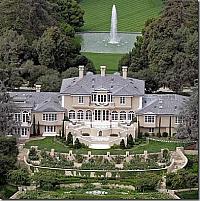When evaluating where to invest, it's important to latch onto trends that will help support house prices in future years. This helps reduce investment risk and increase returns. As demographic and social changes take place in the UK – along with the more frequently report economic trends, these factors can have a major impact on property price movements.
Property prices will rise if:
 Supply Side:
Supply Side:
- property supply is low
- property building levels are low in the area
- planning and environmental restrictions are severe
- all building and brownfield land is used up
- all large houses for flat conversion opportunities have been finished
- n
 ew greenfield areas are not allowed to be used for building
ew greenfield areas are not allowed to be used for building - the area has protected status (World Heritage Site, Area of Outstanding Natural Beauty, National Park)
Demand side:
- Population growth is high through:
- migration of existing citizens
- immigration of new citizens
- high birth rates from existing citizens
- high birth rates from new immigrant citizens
 New jobs are created – particularly high paid knowledge based jobs
New jobs are created – particularly high paid knowledge based jobs - Outsiders moving into the area – e.g. people buying second homes (holiday homes, pied de terre, second homes for weekend use)
- Positive change occurs in the area that cause wealthy people to move in, through:
- infra-structure developments
- new offices
- new roads
- new jobs
- regeneration
- Education – universities and schools in an area are excellent, improve and have expanding numbers
- Scenery and appeal – if the area becomes popular because of its scenery, quality of life and leisure pursuits (e.g. surfing coastal property in Cornwall, Dorset World Heritage Coastline, golfing communities)
- Wealthy influx of international people – e.g. West London
- Wealthy influx of UK citizens – e.g. wealthy baby-boomers retiring to Cornwall
- Big growth in business – financial and/or services sector is the preference (over manufacturing, retail or public sector)
A property investor needs to consider these criteria – the overlapping spheres of influence, and then select an area with the highest chance of meeting these criteria – as many as possible! Then decide which area to invest in, and within this area, what type of property to invest in. The questions are:
- What type of property will have a supply shortage in future years (prices will rise)
- What area will become far more popular to live in, in future years (prices will rise)
Some of the analysis can be determined by looking at regional population growth figures. In summary, in the UK, the regions projected to have the largest population growth are Greater London and all regions close to the capital. Any area south of the line from the River Severn to the River Trent will see populations expand considerably up until 2025. The NW of England and Wales will only see moderate expansion. NE and North will only see minor expansion, with West Yorkshire higher than the surrounding regions.
To compound the supply-demand imbalance that the south will experience, it's often more difficult to get planning permission to build in the south – environmental restrictions are at least as severe if not more severe than the north. It's difficult to imagine large scale home building programmes getting off the ground in the south – where the homes will be most in demand. So we believe there will be a severe supply crunch in the next ten years that will drive property prices up further in southern counties. This might start taking effect by end 2009.
A few examples of areas of interest – where overlapping positive criteria emerge:
 Oxford : An expanding wealthy student population. Severe environmental and home building restrictions. Excellent place to live with good schools, colleges, historic city centre, good communications to London by road and rail. Increasing population. Fair amount of new business moving in. Commuting to London. Protected green belt. Close to the lovely Cotswolds. Increasing population with many migrant eastern Europeans putting further pressure on housing. Wealthy retiring baby-boomers also like Oxford because it has a nice city centre atmosphere, lovely countryside and yet it's still close to London for all those business contacts. Okay, prices are already high, but we believe they will rise further. An interesting play is to buy a 5 bedroom terrace in one of the up and coming areas still close to the University, then rent to students (high yields, they normally pay, more respectable than they used to be, with reputations they need to keep). Then hold the property for ten years, then renovate the property, add a loft room as an example, then sell as large family home (now only 18% capital gains tax).
Oxford : An expanding wealthy student population. Severe environmental and home building restrictions. Excellent place to live with good schools, colleges, historic city centre, good communications to London by road and rail. Increasing population. Fair amount of new business moving in. Commuting to London. Protected green belt. Close to the lovely Cotswolds. Increasing population with many migrant eastern Europeans putting further pressure on housing. Wealthy retiring baby-boomers also like Oxford because it has a nice city centre atmosphere, lovely countryside and yet it's still close to London for all those business contacts. Okay, prices are already high, but we believe they will rise further. An interesting play is to buy a 5 bedroom terrace in one of the up and coming areas still close to the University, then rent to students (high yields, they normally pay, more respectable than they used to be, with reputations they need to keep). Then hold the property for ten years, then renovate the property, add a loft room as an example, then sell as large family home (now only 18% capital gains tax).
Hackney South (Haggerston) - London : An expanding population – very high immigrant population (>50%) with high birth rates (75% of births to non UK others). House prices are relatively low compared with other parts of London. New infra-structure projects include:
- East London Line railway (Haggerston)
- Kings Cross High Speeds One rail link (1½ miles away)
- Stratford International (1½ miles away)
- Olympics (1½ miles away)
- City of London financial centre (1½ miles away)
 As more wealthy city people move in, house prices are likely to rise. Good quality Victorian flats and houses in quiet streets are a good play. Low priced ex-council flats could be worth a look if they are secure, close to transport links and crime levels in the blocks are not too high. Anywhere near the new Haggerston station is likely to be a good investment. Hackney has come up a long way from the depressing period of the 1970-1985 period when many properties were boarded up and no-one wanted to live there mainly because of high crime rates. But regeneration is ongoing and all the infra-structure development close by will help see the area improve further and help the area join the mainstream London property market. Hoxton is already very trendy and expensive – this effect will ripple to areas north and east as transport links improve and better access to high paid city jobs help drive up demand and prices.
As more wealthy city people move in, house prices are likely to rise. Good quality Victorian flats and houses in quiet streets are a good play. Low priced ex-council flats could be worth a look if they are secure, close to transport links and crime levels in the blocks are not too high. Anywhere near the new Haggerston station is likely to be a good investment. Hackney has come up a long way from the depressing period of the 1970-1985 period when many properties were boarded up and no-one wanted to live there mainly because of high crime rates. But regeneration is ongoing and all the infra-structure development close by will help see the area improve further and help the area join the mainstream London property market. Hoxton is already very trendy and expensive – this effect will ripple to areas north and east as transport links improve and better access to high paid city jobs help drive up demand and prices.
Winchester : Excellent public and state schools. Extreme to severe environmental and home building restrictions – almost impossible to build new houses. Excellent place to live with beautiful countryside, low population density, historic city centre and colleges, very good communications to London by rail (55 minute commute). The population in Hampshire is increasing, but not much room left in Winchester. Consultants and small businesses moving in. Protected green belt and areas of outstanding natural beauty in the South Downs. Close to the south coast for boating and beaches, plus shopping in Southampton and Portsmouth. Wealthy retiring baby-boomers also like Winchester because it has a nice town centre, lovely countryside, very low crime levels and yet it is still close to London for all those business contacts and old friends. Prices are already high, but we believe they will rise further. An interesting play is to buy a large central terrace house and convert to upper end apartments for retiring baby-boomers and/or wealthy parents of Winchester college kids. Any splitting would of course need planning permission, so don't put in an offer before talking openly to the local planning offices (getting some assurances that permission would be granted). A quick renovation and splitting would only be subject to 18% capital gains tax – rather than the old 40%.
Gravesend: Ebbsfleet opened last year – direct trains to Paris, Kings Cross and Brussels will provide a huge boost. Improvements to the A2 will help. This previously down-at-heel Victorian town will see prices continue to rise as more wealthy commuters move in. Excellent local public schools help (Cobham Hall is an example). The area has a Grammar School system – so if your kids are bright, you get top quality education for no cost! By 2010 it should be possible to commute from Gravesend to London Kings Cross in about 22 minutes! It will be quicker to get from this seaside town to Kings Cross than Fulham! Some jewels are the Windmill Hill area of Gravesend – with nice views, park, Georgian homes and still close to the centre of town. On the outskirts to the south are some large homes with gardens. Purchase of properties for wealthy commuters is likely to see good returns. Down at heel Northfleet is worth a look. Prosperous Southfleet – a lovely village within 5 mins drive of the new station is a sure winner. Istead Rise is also worth a look. As are the many countryside villages between Southfleet and Meophem on the North Downs – an area of outstanding natural beauty in the Garden of England.
Areas to avoid: From 2002 to 2007, house prices shot up in the north and Midlands of England. They were correctly playing catch-up to escalations experienced in London and the south and south-east. They were also stimulated by massive government public spending injections for hospitals, schools, public sector jobs generally and general re-generations funds. However, much of this funding is now coming to an end as the cash strapped government starts to rein back public spending and stop public sector jobs growth (which has been unsustainable). Meanwhile, the manufacturing sector that saw growth of up to 5% per annum in recent years is start a severe slowdown and is likely to slip into recession later this year as the UK economy, Euro economies and global economies GDPs slow. Furthermore, although price / earning ratios are relatively high in the northern counties compared with London and the south, this masks the fact that people in the north have a higher mortgages as an average loan to value of their properties. Because rates have gone up, we expect more loans payments distress in the north than the south and hence this will likely hit northern property prices in the next few years. Overall, it does not look positive for the north in the coming few years. But there are a few bright areas in the north:
- Manchester – continued business expansion and infra-structure developments, plus airport, road and re-generation improvements
- Derby - £2 billion to be spent in the centre on regeneration up until 2020, close to East Midlands Airport, M1, Peak District, River Derwent – with Toyota, Egg and other companies expanding
- Bradford – continued large scale regeneration, historic interest, proximity to Leeds and Leeds-Bradford Airport, improving from a low base.
- Bury – can only improve, possibly the most distressed town in the UK, centre of interest from the prince of Wales in regeneration and improvement. Low priced property, with proximity to Manchester a plus.
- Blackpool – regeneration, retiring baby-boomers from NW England, entertainments, leisure and some new businesses (even has an airport)
In Scotland, we believe many areas will do well. Wealthy baby-boomers moving from England to places like Inverness will help property prices. We see Aberdeen continuing to boom as oil prices stay high – any area within 50 miles of the Granite City will do well. Dundee will continue to regenerate from a low base – and is close to very expensive Edinburgh.
Want to make serious money – read this
To be an ultra-wealthy investor, you need to follow certain traits that will differentiate you from the average person. This is based on our experiences in property investing and wealth creation. Property investors on the whole are not your average person – anyone who has attended a property show or auction will attest to this. In general, property investors tend to have the following traits:
 like to be in control of their finances and agenda
like to be in control of their finances and agenda - are creative both financially and practically
- are imaginative
- consider the future – look at trends, predictions and plan for the future
- can have dominant personalities
- action focused – and able to take risk without having sleepless nights
- not necessarily team players or good with people – though the best investors are good with people
- disciplined and hard working
- able to sacrifice time with family and friends in pursuit of their goals
- can be selfish
- often individualistic
- set challenging targets and goal
- continually looking to improve
- highly motivated
- tend to have a capitalist attitude and values
- positive “can do” attitude
 enthusiastic about making money and owning property
enthusiastic about making money and owning property - are proud to be a property investor, but feel they don't need to tell the world about it
- ignore family and friend's advice – “able to go it alone”
- careful with money
- like negotiating
- well educated
- widely read
- more likely to be married with children or highly motivated singles
- like to learn new things – open-minded
- not scared to go with their own views
- intuitive
- show leadership and/or managerial traits
If you have any of the following traits below, you will likely be a less effective property investor and either find it more difficult to make money or not find the time or energy or have the inclination to do so:
 risk averse
risk averse - not creative
- left wing socialist
- unimaginative
- can old handle a employed job – prefer to spend all spare time with family, friends and hobbies
- do not plan for the future
- non action oriented, reactive
- give all your time and energy to other people
- listen to family and friends advice – always seeking to please them
- negative outlook
 worry a lot about small things
worry a lot about small things - wasteful with money
- drink too much, smoke too much, take drugs
- don't like negotiating
- low motivation levels
- do not read
- watch popular TV programmes for more than an hour a day
- more likely to be single or divorced
- sometimes or often from low education or deprived background
- get depressed over small things
 One of the single biggest factors holding back most people from become rich, even if they want to become rich, is their family or spouse. Sorry to have to say this, but we're try to help and be frank and objective. This does not mean to say you will need to change partner or friends, or drop your family – such actions can be even more damaging financially and ruin your life since family and friends are so important for one's well-being. A few tips on how you can manage the relationship with your family and friends:
One of the single biggest factors holding back most people from become rich, even if they want to become rich, is their family or spouse. Sorry to have to say this, but we're try to help and be frank and objective. This does not mean to say you will need to change partner or friends, or drop your family – such actions can be even more damaging financially and ruin your life since family and friends are so important for one's well-being. A few tips on how you can manage the relationship with your family and friends:
- Family and Friends: Do not talk about your epic property investing exploits with family and friends – they may subconsciously want to bring you down to earth or be genuinely upset or worried you may change if you become wealthy (or course you have no intention of doing so, but perception is more important than fact).
- Spouse-Partner Communication: You need to try and make your spouse understand your goals, how achieving wealth will help both of you, and how the world will not fall apart if you have any challenges during your property investing exploits. Try and not hide things – women are very perceptive about hidden secrets and your nervousness will be spotted. And men can get envious of women who do well in property investing – do not brag about it too much if you are a successful women investor. And remember, if you end up splitting, then the wealth will be spilt including the properties – it could be a financial disaster. Safeguard your marriage or partnership as a top priority – it's economically very important! As well as being good for the kids and your lifestyle of course.
 Parents: If you are from a modest background and want to be super-wealthy, if you live close to your parents, do not expect to be super-rich. The peer pressure you will receive in subtle ways will lead to you holding back from taking huge risk. After you've made a packet, you can move back close to your parents. But you need to unshackle yourself from any views that might get in the way of making serious money, unless your parents are business people and understand (95% of parents are employees or public sector workers, so don't expect your parents to understand private entrepreneurial business, goals, finance and the fun of making serious money!). Unshackle yourself from old norms and old expectations.
Parents: If you are from a modest background and want to be super-wealthy, if you live close to your parents, do not expect to be super-rich. The peer pressure you will receive in subtle ways will lead to you holding back from taking huge risk. After you've made a packet, you can move back close to your parents. But you need to unshackle yourself from any views that might get in the way of making serious money, unless your parents are business people and understand (95% of parents are employees or public sector workers, so don't expect your parents to understand private entrepreneurial business, goals, finance and the fun of making serious money!). Unshackle yourself from old norms and old expectations. - Negative Poor People: If you surround yourself with negative people that have no money, expect to end up the same. Nothing wrong with poor people of course – they work hard, many have come from disadvantaged circumstances and live day-to-day – many admirable hard working families. But if you get distracted or influenced by other people's negative, risk averse or worried behaviours – you will never be truly wealthy. How can you expect a poor person to understand property investing fundamentals, plans, goals, values and business models – they probably have zero interest, and may feel envious or even jealous of your exploits. They will think it's okay for you because you have money. They will not understand they you do not need money to make money. Any of your convincing them otherwise will probably land you in trouble – so keep your mouth shut and try and find like minded individuals that you can learn from, share good practice and get enthusiastic with.
 Culture : In some cultures, it seems to be frowned upon to talk about making serious money. The poor will complain about the wealthy as if they have been ripped-off by them – jealousy and envy come to the fore. The UK is one of those countries where it's difficult to openly discuss business with many people. The reason is probably because 95% of the population are employees (working for other people) of which half work for the government (public sector). Both private and public sector employees are “not” businessmen or women – because they do not own their own businesses. They work in a protected environment for investors who own the business. However, if you are a public sector worker who owns five buy-to-let properties, you are a business person. But do not expect your public sector colleagues to understand what drives you, financial spreadsheets, business plans, investments, value creation and the like. Best keep your mouth shut or you'll end up confusing the heck out of them! Better to find a club, forum or like minded friends to share your practices with. In the USA, the culture is far more receptive to business – there are more small businesses, more private sector employees and less public sector employees – many people migrated into the USA and started with nothing then became wealthy through private business (George Soros is a good example).
Culture : In some cultures, it seems to be frowned upon to talk about making serious money. The poor will complain about the wealthy as if they have been ripped-off by them – jealousy and envy come to the fore. The UK is one of those countries where it's difficult to openly discuss business with many people. The reason is probably because 95% of the population are employees (working for other people) of which half work for the government (public sector). Both private and public sector employees are “not” businessmen or women – because they do not own their own businesses. They work in a protected environment for investors who own the business. However, if you are a public sector worker who owns five buy-to-let properties, you are a business person. But do not expect your public sector colleagues to understand what drives you, financial spreadsheets, business plans, investments, value creation and the like. Best keep your mouth shut or you'll end up confusing the heck out of them! Better to find a club, forum or like minded friends to share your practices with. In the USA, the culture is far more receptive to business – there are more small businesses, more private sector employees and less public sector employees – many people migrated into the USA and started with nothing then became wealthy through private business (George Soros is a good example).
An interesting exercise is to list all your friends and family, note down who is a private business person, then make efforts to discuss business with them only – don't distract your other family and friends with your exploits – you'll confuse them at best, and upset or destroy your friendships with them at worst.
One thing that does not matter is whether you are extrovert or introvert. Extroverts tend to make quick decisions, are less worried about taking the plunge and like meeting people and talking lots! They like listening to themselves and do not listen or absorb other people's views well – this can be dangerous but if they have introvert advisors to keep them on the straight and narrow (e.g. an introvert solicitor and accountant) they can make very quick progress to huge wealth. Extroverts are also more likely to take accessive risk and go bankrupt! Introverts tend to evaluate all risks and are more cautious with decisions - decisions are rational, objective and well thought through. They can lose opportunities because of this, but are more likely to steadily create wealth (without going bankrupt!) rather than experiencing a roller coaster ride to wealth creation. Introverts like space, time to think, and do not use emotion for decision making. They like listening and find "in your face" extroverts annoying and irritating. Both extroverts and introverts - as long as they are both motivated, can become super wealthy.
| 
| 
|
Think Like the Rich – Action Like the Rich
If you want to be rich your need to firstly “think like the rich” then “action like the rich”. This begins with:
- honouring commitments
- performing business with honesty and integrity
- improving your reputation
- seeking to learn and understand whilst being able to make your own decisions
- setting goals and striving to achieve these goals
- being action focused
- being generous when you have made money
- valuing time more than money
- being efficient in the use of time
- leveraging other people to make you money (contractors, employees, consultants, helpers)
- leveraging money to make great net worth (loaning and investing)
- concentrating on build up of net worth
 (rather than earned income)
(rather than earned income) - being prudent with expenses
- treating your partner, children and family as number one priority and respecting them
- being disciplined and honest with your accounting and management of business affairs
- discarding your “baggage” – old norms (e.g. "your family has always wanted you to settle down and get a nice steady job")
- taking managed risk whilst managing mental worries and concerns
- identifying gaps in the market where value can be easily created
- making other people feel important
- being thoughtful about health, eating and exercise
- being careful with personal safety and security
- learning from mistakes whilst taking responsibility for your own misjudgments
- never a victim – always an opportunity
- glass is half full not half empty
- proactive positive “can do” mindset
If you can follow these traits of the rich, you will almost certainly become rich – even ultra-rich. It requires dedication, effort, focus and constant thought. Your goal to become rich should drive your behaviours from a day-to-day standpoint.
If you have too many negative thoughts – you need to consign these to the dustbin. You only live once, time is running out, and it's no use putting off that first important action – before you know it, you'll be old and you won't have the energy, health or time to get rich anymore. It takes time and patience. The earlier you start the better.
We hope this has given you some helpful insights into the psychology of the rich - and a steer on how to use a rich person's winning mentality to achieve your investment goals and wealth targets.
Oil Price and Economy Update UK
The good news for all property investors is that oil price have dropped from $147/bbl earlier this year to $108/bbl this month. We still believe oil prices will rise back again and stick with our prediction we made June 2007 that oil prices will be ca. $125/bbl by end 2008. The lowering of the oil price and slowing of the global economy should lead to inflation dropping and should allow interest rates to drop by year end. We expect a 0.25% (or possible 0.5%) drop in UK rates by January 2009. We also expect stagnant GDP growth for the next 6 month, the moderate growth after this. As previously advises, the UK is about eight month behind the US cycle. The USA is just starting to come out of their trough and we believe the UK will follow suit around March 2009. So hang on for a while then expect to see improvements by mid 2009.
 In London, we see jobs losses in the financial sector for the next 6 months, but not heavy. Meanwhile the city continues to grow in GDP and population. With the Olympics 4 years away, East London is seeing big new investments and much regenerations. It will be exciting times as the city gets the global attention and continues to prosper from international finance and business.
In London, we see jobs losses in the financial sector for the next 6 months, but not heavy. Meanwhile the city continues to grow in GDP and population. With the Olympics 4 years away, East London is seeing big new investments and much regenerations. It will be exciting times as the city gets the global attention and continues to prosper from international finance and business.
We're a bit downbeat about parts of the north. A flood of public sectors jobs and buy-to-let investors bought properties for low cost and prices have sky-rocketed. By 2005, the prices in Newcastle city centre apartments were not much different to those in Stratford East London. We expect the south and London and the SE to see prices rising by end 2009 whilst the north stays subdued. There are likely to be exceptions – Derby, Bradford, Manchester (Salford, Trafford Park ) all look attractive because of regeneration projects, population growth and inward investment (with low prices).
UK Market Update
 Nationwide reported prices dropping by -1.3% in July. Similar trends were report by Halifax and Hometrack (-0.9%, less than July's -1.2%). The Land Registry recorded -0.6% in July. All indicators were down. The market continues to correct and it's likely further drops will occur up until at least year end. Many areas of London rose 25% up until June 2007, and have corrected back about 10% so far. The tough conditions for raising finance (credit crunch) is making the market slow further, and it's not until the banks confidence levels rise and they start lending to one another that conditions will improve. Inflation at 4% and interest rates such at 5% don't help. Meanwhile growth in the economy has ground to a half with manufacturing entering a phase of recession. Expect a rough ride for the next 6 months at least. But bargains are out their for investors flush with cash, or with ample financing possibilities.
Nationwide reported prices dropping by -1.3% in July. Similar trends were report by Halifax and Hometrack (-0.9%, less than July's -1.2%). The Land Registry recorded -0.6% in July. All indicators were down. The market continues to correct and it's likely further drops will occur up until at least year end. Many areas of London rose 25% up until June 2007, and have corrected back about 10% so far. The tough conditions for raising finance (credit crunch) is making the market slow further, and it's not until the banks confidence levels rise and they start lending to one another that conditions will improve. Inflation at 4% and interest rates such at 5% don't help. Meanwhile growth in the economy has ground to a half with manufacturing entering a phase of recession. Expect a rough ride for the next 6 months at least. But bargains are out their for investors flush with cash, or with ample financing possibilities.
 Dermal fillers using Succeev Boletero Juvederm Restylane and Teosyal
Dermal fillers using Succeev Boletero Juvederm Restylane and Teosyal




























